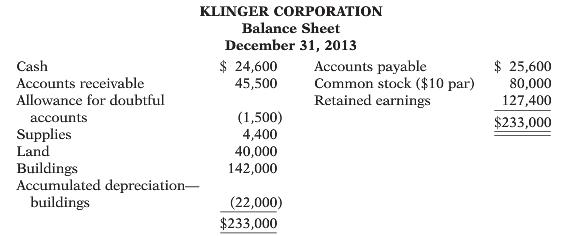Klinger Corporations balance sheet at December 31, 2013, is presented below. During 2014, the following transactions occurred.
Question:
Klinger Corporation’s balance sheet at December 31, 2013, is presented below.

During 2014, the following transactions occurred.
1. On January 1, 2014, Klinger issued 1,200 shares of $40 par, 7% preferred stock for $49,200.
2. On January 1, 2014, Klinger also issued 900 shares of the $10 par value common stock for $21,000.
3. Klinger performed services for $320,000 on account.
4. On April 1, 2014, Klinger collected fees of $36,000 in advance for services to be performed from April 1, 2014, to March 31, 2015.
5. Klinger collected $276,000 from customers on account.
6. Klinger bought $35,100 of supplies on account.
7. Klinger paid $32,200 on accounts payable.
8. Klinger reacquired 400 shares of its common stock on June 1, 2014, for $28 per share.
9. Paid other operating expenses of $188,200.
10. On December 31, 2014, Klinger declared the annual preferred stock dividend and a $1.20 per share dividend on the outstanding common stock, all payable on January 15, 2015.
11. An account receivable of $1,700 which originated in 2013 is written off as uncollectible.
Adjustment data:
1. A count of supplies indicates that $5,900 of supplies remain unused at year-end.
2. Recorded revenue from item 4 above.
3. The allowance for doubtful accounts should have a balance of $3,500 at year end.
4. Depreciation is recorded on the building on a straight-line basis based on a 30-year life and a salvage value of $10,000.
5. The income tax rate is 30%.
Instructions
(a) Prepare journal entries for the transactions listed above and adjusting entries.
(b) Prepare an adjusted trial balance at December 31, 2014.
(c) Prepare an income statement and a retained earnings statement for the year ending December 31, 2014, and a classified balance sheet as of December 31, 2014.
Salvage ValueSalvage value is the estimated book value of an asset after depreciation is complete, based on what a company expects to receive in exchange for the asset at the end of its useful life. As such, an asset’s estimated salvage value is an important... Dividend
A dividend is a distribution of a portion of company’s earnings, decided and managed by the company’s board of directors, and paid to the shareholders. Dividends are given on the shares. It is a token reward paid to the shareholders for their... Par Value
Par value is the face value of a bond. Par value is important for a bond or fixed-income instrument because it determines its maturity value as well as the dollar value of coupon payments. The market price of a bond may be above or below par,...
Step by Step Answer:

Accounting Tools for Business Decision Making
ISBN: 978-1118128169
5th edition
Authors: Paul D. Kimmel, Jerry J. Weygandt, Donald E. Kieso





